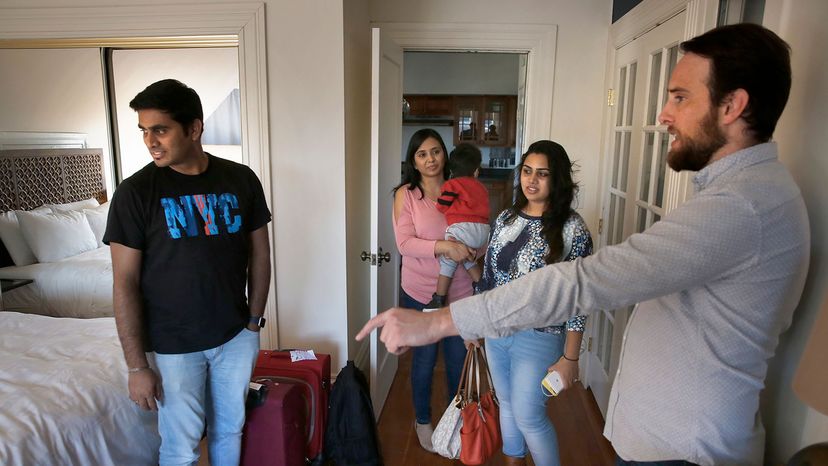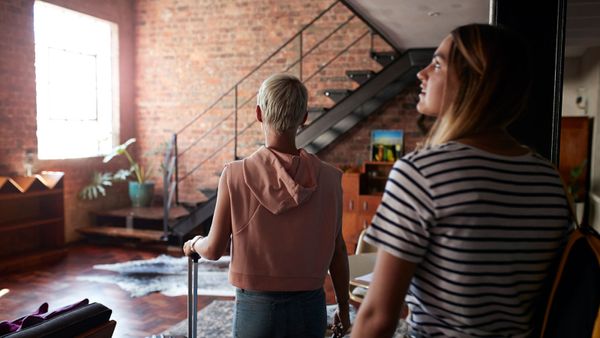A May 2021 Business Insider article reported that Airbnb's average daily rates had grown by 35 percent in the first quarter of 2021 compared to 2020, and as we'll see, daily rates affect all the other charges down the line. To many, the fees are anything but clear-cut. Here's a breakdown of fees you can expect to pay:
Nightly fees: These are set by the rental host, each of whom has a slightly different way of setting the price. "I know what my break-even point is for the year and that gives me a base rate I have to charge per night at so many nights rented per year," says Erin Turner, who uses both Airbnb and VRBO to rent her cabin in Tennessee. "From there I have to determine what portion of the rate will go to online booking agents (Airbnb, VRBO, TripAdvisor, Booking.com) per night and account for that when pricing the room." She also factors in the costs of maintenance, utilities, booking software, insurance, permits and other normal business expenses.
Cleaning fees: These also are set by hosts, and typically are the same per length of stay, whether you rent for one night or seven. So cost efficiency really depends on the rental period. Enhanced (and more expensive) cleaning protocols necessitated by COVID-19 especially screwed things up.
"Airbnb introduced a policy requiring hosts to complete a five-step enhanced cleaning process," says Hatton, a good thing. "However, incorporating such a policy demands additional time and resources that translate to extra fees for us travelers."
Then, of course, there's the fact that professional cleaning rates vary widely by location and the size of the rental. However, Airbnb representative Charlie Urbancic says that among active Airbnb listings globally, 45 percent do not charge a cleaning fee. "For listings that do charge a cleaning fee, the fee on average is less than 10 percent of the total reservation cost," he notes.
Service fees: Another major sticking point for renters is often the service fee that's tacked on at the end. On its website Airbnb says it generally charges guests a fee that is less than 14.2 percent of the total of the nightly fee plus the cleaning fee plus any additional guest fees. "The service fee is supposedly for the products, services and support provided by Airbnb. But then surely most of it should be paid by the hosts, plus they are charging for support when Airbnb is notoriously difficult to actually contact and get any response from," says travel expert Jill Miller with Your RV Lifestyle.
"Broke Backpacker" Hatton points out that the Airbnb service has grown from a "reasonable 6.6 percent of your total stay in 2016 to a staggering 14 to 18 percent which certainly eats into travelers budgets and limits the potential for other adventures!"
Hosts are generally charged 3 to 5 percent fee, also. "In fairness to Airbnb, the fees they charge for their service is quite reasonable, especially when you factor in that they process the credit cards for the hosts, which runs upward of 3 percent on every transaction," says Ann Cross, owner and operator of two Airbnb rentals, Remington Flats and The Fort Apartment.
VRBO has a similar service fee structure of roughly 9 to 15 percent. "VRBO's traveler service fee was introduced in 2016 and varies depending on the cost of the booking — generally, the higher the reservation amount, the lower the percentage of the fee," says VRBO representative Alison Kwong. "Travelers that book and pay through VRBO are protected by the Book with Confidence Guarantee and have access to 24/7 customer service."
Pet fees: Not bringing pets? Don't even worry about this one. But if you are, expect to pay a chunk more for the extra cleaning considerations that come with having animals. Hosts decide on the amount.
Local taxes: These local lodging taxes are added to the bill where there are laws requiring vacation rentals to pay tax. "A few years ago, a lot of hosts were 'forgetting' to pay local taxes. They were supposed to take them out of their Airbnb revenues and transfer them to the local tax authorities," industry expert Masson says. "Under the pressure of municipalities, Airbnb has started collecting taxes directly from guests and sending the money to tax authorities. So, guests may also see an increase in the overall cost of their Airbnb, as things are done more legally these days."
These occupancy taxes are obviously not set by the service, but by the local government, according to Airbnb's Urbancic. "They are generally the same rates that apply to hotels and other hospitality businesses in those areas," he explains.
So, would it be cheaper overall to go to a hotel as opposed to a vacation rental? That depends. A study by intercity bus company Busbud found that Airbnb prices were better than hotels in seven of the 12 U.S. cities it looked at. "Overall, Airbnb wins the price war in the Northeast and Pacific Northwest, while hotels fare better in the South," the company wrote. Also in the nine European cities it examined, Airbnb was cheaper than hotels in eight cases. Barcelona was the outlier: "On average, Airbnb rates run 81 percent higher than hotel costs in the most cosmopolitan city in Spain," it said. Tourist demand and a special city permit required to advertise apartments may be to blame for that spike.
Of course the type of hotel and the type of rental you're looking at may not be comparable. Plus, you'll likely have more space and a special experience with a vacation rental that you wouldn't get with a cookie-cutter hotel. "My cabin is still much less expensive for the night than a typical hotel stay and it sleeps six and you get two baths, a kitchen, amazing views, and a unique experience," points out Turner, who is both an Airbnb Superhost and a VRBO Premier Partner.


